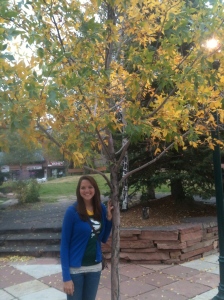Three cowboys were caught stealing horses down around the Rio Grande. The posse who apprehended the miscreants had their right to do what they wished with them. Horse thieving was a hang-able offense, so they decided to go that route. But what would they do with the bodies? They had no intentions of touching the dead wranglers so they hatched a brilliant plan. They would hang them from the trees on the cliff that hung over the river. Once they quite kicking, they would cut the rope and the bodies would float down river, peacefully carried along by the meandering current of the Rio Grande.
The tied the noose’s, attached the to the trees and picked their first victim. The executioners asked him if he had any last words. His reply: “The horses were worth it!” Then they kicked him off the solid ground and his feet began swinging. The noose, however, did not pull tight and he slipped through the knot. Splashing into the river, he chuckled, waved to his apprehenders, and joyously floated down the river, relishing in his positive turn of fortune, and second chance on life.
The second man up had the same result as the first. When asked for his last words, he simply said: “Death don’t scare me!” Then he slipped through the noose, splashed into the river and swam out of sight. The posse, never the quitting type, proceeded onto the third man. They put the noose around his neck and offered the chance to say a few final words.
After pausing for a second, the horse thief said: “Can you tighten this noose a little bit? I can’t swim!”
When it comes to deserved punishment, everyone likes to see it doled out. Justice is a central desire of a man’s heart. When people have wronged us, been unfair, or unjustly praised or successful, there is a little bit of us that wants to see retribution. For many it’s a little bit bigger than a “small part of us.” Justice is even sweeter when we get to hand it out. When our fingers get to rest on the cold steel of the switch or we are kicking them off the cliff. When the key to their cell goes in our pocket or we get to clamp the chains on their wrists. Punishment, sentencing, discipline at the hand of the offended is the way we would like it but contrary to the way God intended it.
If there was anyone in scripture who had a reason to want justice it was Joseph. He was apprehended by his brothers, thrown in a pit, and sold into slavery. His brothers had had it out for him for sometime and then acted upon their jealousy. They lied to his father about his whereabouts.
But God took him from slave to second in command of Potipher’s house.
While he was in Pothiphar’s house “the Lord was with Joseph and he prospered” and his “master saw that the Lord was with and that the Lord gave him success in everything he did”. (Gen. 39.2-3) Potipher worried about nothing in his house because Joseph, through God, had it covered. Second-in-command is far from where he was in slavery with the Ishmaelites, but not far enough away to never return. A false accusation from Potipher’s wife, another lost coat, and once again Joseph finds himself in chains. This time it was the prison of the Pharoah.
But the Lord was with Joseph and gave him success and the Lord took him from prisoner to second-in-command of the prison. (Genesis 39.30-23) Still a prisoner, but one with power and authority.
As a powerful prisoner, God gave him the opportunity to influence people, interpret dreams, and tell his story. And just as we the readers are privy to the whole story, Joseph fills in those in prison. He says: “I was forcibly carried off from the land of the Hebrews, and even here I have done nothing to deserve being put in this dungeon.” (Gen 40.15) In contra-distinction to God, the cup bearere would forget Joseph. (Gen 40.23) God never did!
Two years later, when Pharoah had a dream, Joseph was called into action. When Joseph had interpreted the dreams of Pharoah, he was promoted to second in command of the kingdom of Egypt.
Joseph again was taken, by God, from prisoner to palace, from slave to second in command.
But for what purpose?
Reading the story for the first time, without any prior knowledge, this story would be a frustrating tale. Repetition and duplication abound in this story. He’s lost two coats, ended up a slave/prisoner twice, been in charge twice and interpreted 3 different sets of dreams. Much of this story has not even touched the main conflict that began it: Joseph and his brothers.
God has been at work for the last 13 years all to bring about this meeting in Genesis 42. God has brought famine to the land of the Hebrews, dreams to Pharaoh and position to Joseph, all in order to bring Joseph and his brothers face to face in chapter 42 (and a second time in 43). During the ensueing chapters, the tension builds to a breaking point with Joseph. In the beginning verses of chapter 45, Joseph reveals himself to his brothers.
In that moment his brothers were “terrified [hb. bahal] at his presence” (Gen 45.3) Here this man, who they thought had been dead for years, has appeared before them. Where they terrified at what they thought he would do to them? Terrified that he was a ghost? Terrified at the thought of his power? Scripture isn’t explicit, however, Joseph has a choice here:
- He is the 2nd most powerful man on earth and he can fix this wrong that’s been done to him.
- He can start anew and move on from the 13 years of torment that started that fateful day in the Judean wilderness.
In the New Testament a couple different words are translated “forgive”. One of them, aphiemi, means ‘to let go”; like a jar left [aphiemi] at a well (John 4.28) or a fever that leaves [aphiemi] a person (Mark 1.31). Go ahead, sing the song…you know you want to bust out a few lines of “let it go” from Frozen.
Another word translated “forgive” is the word charizomai. Literally, the word means to give grace like it is translated in Romans 8.22. This is one of Paul’s favorite words for forgiveness. It puts the second touch on the process of forgiveness. Which is clearly seen in the Joseph.
Step 1: “Let it go!” Joseph met with his brothers a couple times before he became known to them (Gen 45). He spent considerable time with them and asked them a couple times, in odd ways, if they had learned their lesson. Joseph was in the place where he finally had to let it go and move on. He released the act from his mind.
Step 2: “Give grace” Joseph could have let it go, but still turned his back on them; “Stab me once shame on you, stab me twice shame on me” kind of thinking. But forgiveness is a two-step process. Letting go is the first step, but giving grace is the second. Joseph saved his family…he gave grace. He treated them better than he had before the transgression had taken place.
When you have been wronged; when the chance comes up to “settle” or “forgive”, how do you respond? Can you “let it go” without “giving grace”? Do you respond by treating them well, but never letting it go? Does bitterness take root?
Joseph’s next 30 years would be forever changed because he was able to “let it go” and to “give grace”. His family was saved, the people of God saved, because Joseph was able to forgive. “You intended to harm me, but God intended it for good to accomplish what is now being done, the saving of many lives.” (Gen 50.20)
From slave to savior…because of forgiveness.



